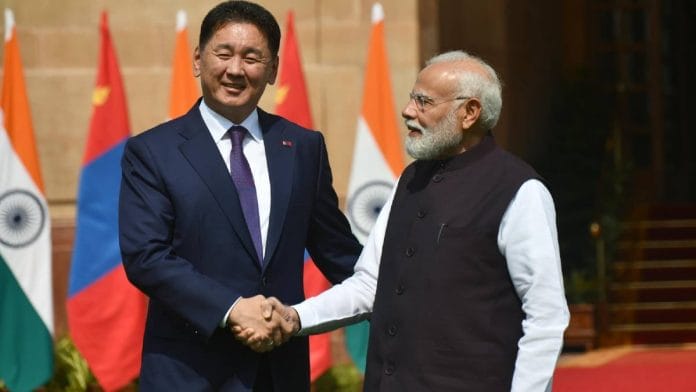New Delhi: India Tuesday announced the appointment of a defence attaché at its embassy in Ulaanbaatar, while also mulling negotiations with both Mongolia and Russia for transport of minerals from the landlocked country in Eastern Asia, as it looks to step up its strategic positioning in the region.
“Our defence and security cooperation is also steadily strengthening. We have launched several new initiatives, from training programmes to the appointment of a defence attaché at the embassy. India will also launch a new capacity-building programme for Mongolia’s border security forces,” Prime Minister Narendra Modi said in a joint press statement alongside the President of Mongolia, Khurelsukh Ukhnaa, who is on a visit to India.
P. Kumaran, Secretary (East) in the Ministry of External Affairs, at a special press briefing later Tuesday highlighted that the appointment of a defence attaché “underscores” the growing defence relationship between India and Mongolia.
The two countries have in recent years strengthened military cooperation with a focus on capacity-building and joint exercises. Nomadic Elephant and Khaan Quest are the two joint exercises between the two militaries.
The President of Mongolia also met with Rajnath Singh, Minister of Defence, and requested greater cooperation in the sector. Kumaran also underlined that India will continue to send certain defence equipment to Ulaanbaatar as a part of its grant programme.
The President of Mongolia is in India for a four-day state visit that began Monday. Apart from a ceremonial welcome and meetings with both Modi and Singh, Ukhnaa also toured the Indian Parliament complex.
External Affairs Minister S. Jaishankar called on him Monday evening. Ten memorandums of understanding were signed between New Delhi and Ulaanbaatar Tuesday.
The talks between Modi and Ukhnaa revolved around other themes as well, especially critical minerals and mining resources. Some estimates place Mongolia’s mineral wealth at $1 trillion. Apart from deposits of coking coal, which has interested Indian businesses, Mongolia also has deposits of copper, gold, iron and zinc.
The landlocked country has also unearthed large uranium deposits, signing a deal with French companies earlier this year worth $1.6 billion for the extraction of roughly 2,500 tonnes of uranium per year.
Indian groups such as JSW have in the past indicated interest in purchasing coking coal from Mongolia, however, logistical issues have played a dampener on Indian investment in the country.
“The difficulty is that Mongolia continues to be landlocked. If India has to import coking coal from Mongolia, it would have to be via the port of Tianjin (in China) or the Russian port of Vladivostok,” Kumaran said.
He added that India was in talks with both Moscow and Ulaanbaatar to see if the Trans-Siberian Railway could be used to transport Mongolian cargo to the port of Vladivostok for shipment to India.
India and Russia have also begun discussions over the creation of an Eastern Maritime Corridor that would see Vladivostok connected to the port of Chennai in Tamil Nadu. While the discussions are at the early stage, if successfully implemented, the corridor would see goods transported from the Russian Far East to India within 24 days, from the current time of roughly 40 days.
Kumaran said discussions over usage of the Russian rail system for export of cargo to India are ongoing and still at the preliminary stage. Currently, the Vladivostok route is more expensive than the Tianjin route for export of Mongolia’s minerals to India.
For India, the other area of interest to deepen engagement with Mongolia is its uranium deposits. India has sought to diversify its sources of energy and Ulaanbaatar offers another potential source of uranium. However, the economics behind such plans are yet to be understood.
Mongolia is also home to the single-largest development partnership undertaken by India abroad, an oil refinery that is being built with a $1.7 billion Indian line of credit.
The project has been under construction since the end of the COVID-19 pandemic in 2021. Kumaran Tuesday said the civil work is almost complete and installation of equipment is expected soon.
“It is important for us to have this project completed by 2028. It would help Mongolia’s energy independence… we hope to see this through by 2028,” Kumaran said.
(Edited by Nida Fatima Siddiqui)






